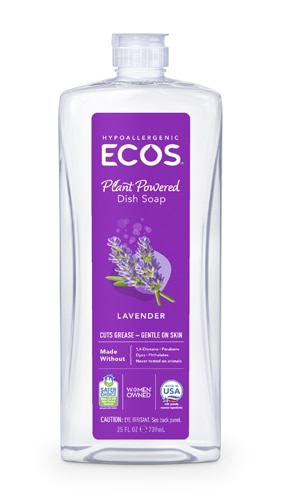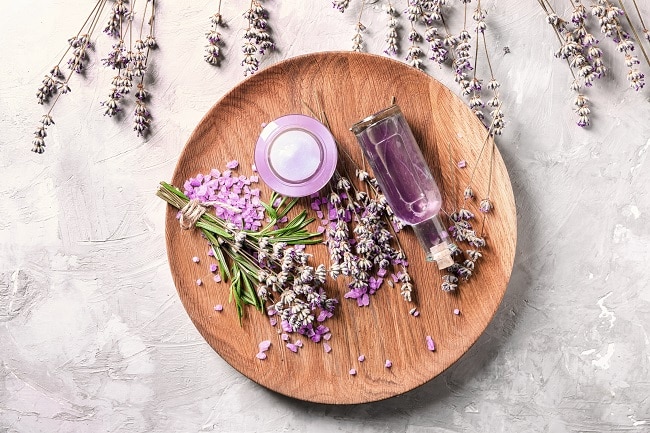Lavender is easily the most popular essential oil today, but its use actually dates back thousands of years. The ancient Egyptians were known to use lavender essential oil (Lavandula angustifolia) for a large array of purposes ranging from perfume to mummification while the Romans used it in cooking and bath water.
Lavender essential oil comes from the aromatic purple flowers of the lavender plant. It only takes a drop or two of this concentrated oil to experience its benefits. In addition to its delightful aroma, research demonstrates its sedative, anti-anxiety, mood promoting, pain-relieving and neuroprotective properties.
In addition to its general calming effects (which can help so many common health complaints), lavender essential oil has a wide array of amazing uses that you can start trying today:
Lavender essential oil uses
1. Decrease Stress and Promote Sleep
First off, lavender is an excellent choice of essential oil if you’re looking to destress and encourage a peaceful atmosphere. A study using animal subjects published in 2018 even shows that a compound in lavender essential oil called linalool may even help to relieve preoperative stress and anxiety. The researchers observed that the inhalation of vaporized lavender activated brain cell receptors. Another study shows that aromatherapy massage with lavender oil helped to improve sleep quality in cardiac patients.†
Diffuse lavender oil in a room, include it in a warm bath, add it to massage oil, or apply it to your temples, wrists and the soles of your feet to experience its stress busting and sedative effects.
2. Household Cleaning
Want to clean your home and relax at the same time? Try using lavender essential oil in homemade cleaning solutions! With its antibacterial and antifungal properties it’s a perfect ingredient for home cleaning and you can reap aromatherapy benefits as you make your home sparkle.
For a general all-purpose cleaner, you can combine 8 ounces water, 4 ounces distilled white vinegar, and 30 drops of lavender essential oil.
3. Healthier Perfume
We all like to smell good, but ideally we want to accomplish this common goal in a healthy way. Conventional perfumes and colognes are filled with synthetic scents that can put you at risk for unwanted health repercussions ranging from headaches to endocrine disruption and more.
So how can you smell good without using toxic fragrances? Essential oils like lavender oil are the perfect answer.
To use lavender oil as a perfume or cologne, apply a couple of drops directly to your wrists, or you can dilute the essential oil in water or with a carrier oil like coconut oil for a more subtle scent.
4. Natural Bug Repellent
Wearing lavender as a natural scent just may keep the bugs away too! A 2008 scientific paper titled “Essential Oils as Green Pesticides: Potential and Constraints” highlights lavender essential oil as a natural mosquito repellent. This is especially great news if you’re wanting to avoid toxic, chemical-laden bug sprays.
To benefit from this essential oil’s bug repelling ability, combine about 2 ounces of distilled water and 30 drops of lavender essential oil in a spray bottle. Mist on body and clothes as needed.
5. Skin Soother
If you do end up as the target of mosquitoes, lavender essential oil can help once again! It’s a great choice for reducing itching and calming inflammation whether you have bug bites, sunburn, or another form of skin irritation. A key component of lavender essential oil, linanool, has been shown to have antioxidant, anti-inflammatory and other activities, so it’s no wonder that lavender oil is known to be such an incredible skin booster.†
To soothe skin, combine a few drops of lavender essential oil with coconut oil or pure aloe vera and apply to areas of concern.
6. Wound and Burn Helper
For centuries, lavender oil has been used traditionally on burns and skin wounds. Thanks to its antimicrobial, anti-inflammatory and antioxidant properties, lavender oil can help with the healing process whether you experience a burn, cut or scrape.†
A study published in 2016 using animal subjects reveals lavender oil’s ability to encourage healing in the early phase by accelerating the formation of granulation tissue (new connective tissue that forms on the surface of a wound during the healing process) and promoting collagen synthesis.†
For burn relief and to encourage healing of cuts, scrapes or wounds, mix 3–5 drops of lavender oil with ½ teaspoon of coconut oil and apply the mixture to the area of concern. You can use your fingers or a clean cotton ball to apply the oil mixture.†
7. Headache Relief
According to research published in the journal, European Neurology, 47 subjects with a definite diagnosis of migraine headache experienced a significant reduction in pain when they inhaled lavender oil for just 15 minutes. Of the 129 headache attack cases within the lavender oil group, 92 responded entirely or partially to lavender.†
For relief from headache discomfort, try inhaling lavender oil for 15 minutes. You can also mix 2 drops of lavender oil with 2 drops of peppermint oil and apply it to the back of your neck and your temples to promote relief of tension and pain.†
8. Travel Remedy
Lavender can help to soothe frayed nerves so it’s a perfect travel companion whether you’re just generally stressed out (perhaps about flying or a long car ride). Or maybe you’re experiencing nausea and stomach discomfort due to motion sickness. The good news — lavender essential oil can help.
Before you embark on your next trip, rub a couple of drops of lavender oil it into your temples, neck and palms to help set yourself up for more relaxed and comfortable travels.
†These statements have not been approved by the Food and Drug Administration. These products are not intended to diagnose, treat, cure or prevent disease.




